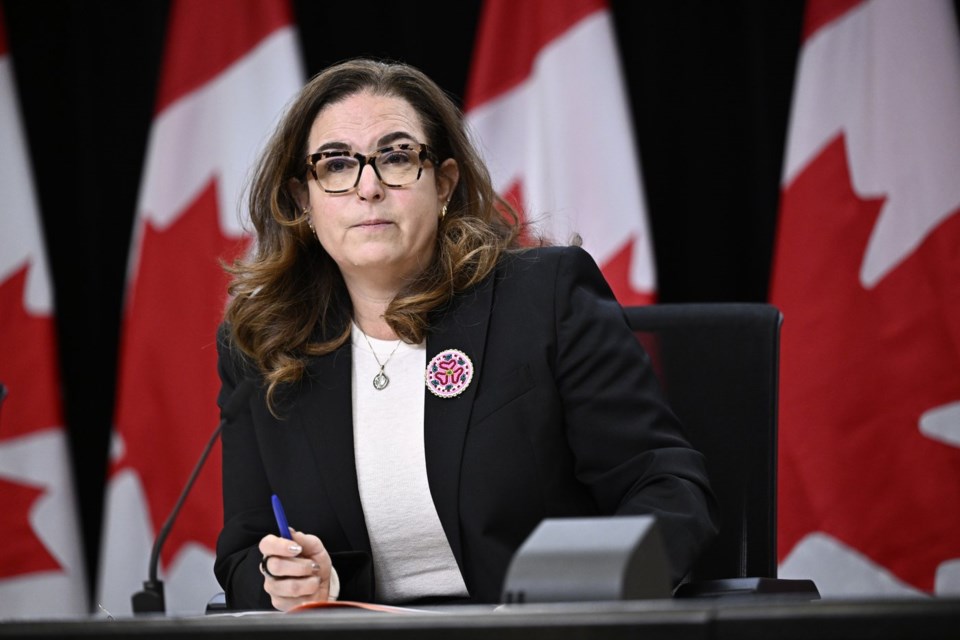OTTAWA — Provinces and territories need to do more to expand and improve their treatment services for people suffering from addictions and mental health conditions before they contemplate whether to make some of those treatments mandatory, federal addictions minister Ya'ara Saks said Friday.
The minister held a press conference to announce the first call for proposals from municipalities and Indigenous communities to access a share of a $150 million emergency treatment fund to respond to Canada's overdose crisis.
But she was peppered with questions about the growing debate about whether some mental health treatments, including addictions treatment, should be compulsory for certain populations.
Several provinces are discussing introducing or expanding compulsory treatment as communities struggle to cope with a countrywide overdose crisis. Nearly 50,000 people in Canada have died of opioid overdoses since 2016.
Concerns have been raised about those proposals by mental health advocates who question whether compulsory treatment is effective, and civil liberties groups who fear for the rights of patients.
Saks would not directly answer whether her government supports the idea or not, repeatedly insisting provinces and territories aren't yet providing the access to treatment needed to even have that conversation.
Saks said she hasn't seen the provinces move enough to scale up treatment "to meet the moment."
"And before we talk about involuntary or voluntary treatment, I would like to see them utilize and access the robust $200 billion worth of healthcare agreements that have been signed across the country to dedicate resources to this."
Saks is referring to new health care funding deals Ottawa signed with provinces and territories over the last two years, a component of which is intended for addictions and mental health services, among other health priorities.
She said health care is under provincial jurisdiction, and that it's up to the provinces "to outline the policies that they see fit."
But before they have discussions about compulsory care, she says they need to ensure adequate treatment services are in place.
"I would encourage B.C. or any other jurisdiction to, first and foremost, before they contemplate whether it is voluntary or involuntary, that they need the actual treatment services in place — which currently they don’t have," she said.
"Health care is a Charter right. It is to help people in a space that they need dignity and assistance in their most vulnerable moments. That is where we should be focused."
Conservative Leader Pierre Poilievre said Thursday he's in favour of mandatory, involuntary drug and psychiatric treatment for kids and prisoners who are found to be incapable of making decisions for themselves.
Poilievre says he's still researching how mandatory treatment would work in the case of adults.
His new position on the issue appears to have solidified after the parents of 13-year-old Brianna MacDonald testified at a parliamentary committee about her mental-health struggles before her overdose death in an encampment of homeless people in Abbotsford, B.C.
"At this point in time, the Leader of the Opposition isn’t talking about policy," Saks said Friday.
"He has contemplated his own perspectives based on a very polarized and a lack-of-evidence-based view of what we know works in the continuum of care for those struggling with substance use."
British Columbia announced last month it would expand involuntary care for people in mental health and addictions crisis, and that the province will open secure facilities for people who have been detained because they're a danger to themselves or others.
B.C. is now in an election campaign.
The B.C. chapter of the Canadian Mental Health Association has expressed misgivings about the plan without better oversight of the mental-health system.
In New Brunswick, the Progressive Conservatives promised in the 2023 throne speech to introduce legislation to force someone with a severe addiction into treatment. The bill was delayed in the spring when the government needed more time to consult on it.
Alberta Premier Danielle Smith has similarly asked her mental health minister to develop " compassionate intervention legislation" that would allow involuntary treatment for people who use drugs if they are a danger to themselves or others.
This report by The Canadian Press was first published Oct. 11, 2024.
Alessia Passafiume and Laura Osman, The Canadian Press



